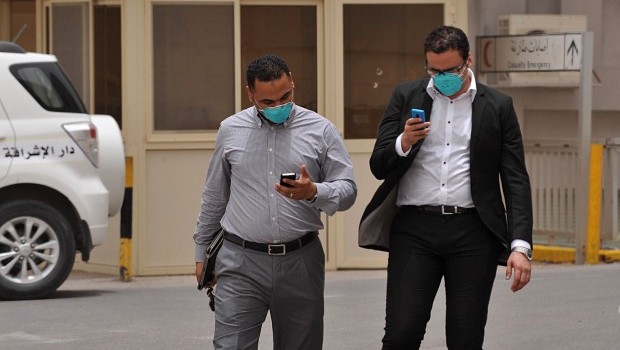
Medical workers wear masks as they leave the emergency room at King Fahd hospital in Hofuf, 370 km east of Riyadh, on June 16, 2013. (AFP PHOTO/FAYEZ NURELDINE)
Jeddah, Asharq Al-Awsat—As Saudi Arabia reported 26 new Middle East Respiratory Syndrome (MERS) cases on Thursday, the Gulf Cooperation Council (GCC) acknowledged the rise in infections but denied that it has become a full-blown epidemic.
Of the new cases, seven were reported in Jeddah, four in Mecca, ten in Riyadh, two in Tabuk, and one each in Hafr al-Batin and Najran. Riyadh also announced that two Saudi nationals who had previously been diagnosed with the disease had died.
Meanwhile, the GCC Health Minister’s Council Executive Board met in Riyadh to discuss the rise in reported MERS cases in the region, making a number of contingency plans to deal with the issue.
Speaking to the press following the meeting, Executive Board Director-General Tawfiq Al-Khawaja said the Gulf states would be exchanging contingency plans to deal with the outbreak, in addition to putting in place plans to expand laboratory facilities to deal with testing for the coronavirus that causes the syndrome. The GCC also recommended that its members undertake media campaigns to deal with misinformation about the virus.
In comments to Asharq Al-Awsat, Khawaja denied that the MERS outbreak is an “epidemic,” stressing that epidemics can only be declared by the World Health Organization (WHO). He confirmed that WHO is coordinating with GCC health authorities to monitor the outbreak.
He said the WHO had deployed a special team to coordinate with Saudi Arabia’s health authorities, including interim Health Minister Adel Fakieh, to combat the increasing number of MERS cases being reported in the Kingdom.
Khawaja said the Council’s recommendations focused on enhancing infection control measures, including providing healthcare professionals more training in infection control.
The GCC agreed to hold a second healthcare conference in the first quarter of 2015 to discuss “supporting patients,” which will review the new infection control measures and monitor their implementation.
